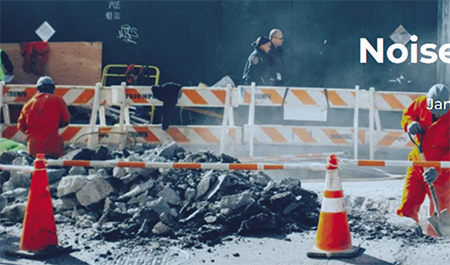 By Sean Delaney
By Sean Delaney
We are all spending more time at home during this pandemic, so loud, continuous outside noise can be frustrating.
Don’t take excessive noise for granted or as a given. Know your rights. The Noise Bylaw provides standards for noise in Toronto. This includes decibel limits and time restrictions for certain types of noise. Use this quick reference to understand the different types of noise regulated by the bylaw. If you wish to review the exact wording in the bylaw, you can find it on the City of Toronto website.
Amplified sound:Amplified sound generally comes from a loudspeaker that amplifies music, voices, or other sounds. This can include sounds from nightclubs, bars, restaurants,
Cafes, patios, or concerts:The bylaw has limits for amplified sound levels, measured at the point the sound is heard.
Bylaw Enforcement Officers can measure the sound levels outside or inside your property and determine whether the sound levels are in compliance with regulations.
There are lower sound level limits within an indoor living area and at night.
Construction noise:
[/b]Clearly audible sound from the operation of equipment used in construction such as the erection of new structures, repair, demolition, land clearing, excavating, laying of pipes, application of concrete, installation of equipment etc. are not allowed during prohibited hours.
Construction noise is not allowed from 7 p.m. overnight to 7 a.m. and not until 9 a.m. on Saturdays.
Clearly audible sound is also not allowed all day Sunday and statutory holidays.
Stationary sources:Stationary sources are devices that do not move from place to place. These types of devices include air conditioners, exhaust systems, fans and generators not used for construction operations. This does not include construction or transportation noise.
Sound levels from stationary sources cannot exceed the sound level limit set in the bylaw or the limit found in provincial noise pollution control guidelines. This does not apply to sound from a stationary source that is in compliance with a provincial environmental compliance approval.
Unreasonable/persistent noise:Unreasonable noise is any noise that disturbs the peace, comfort or convenience of a reasonable person. Unreasonable noise does not include common household or workplace sounds such as noise from moving furniture, children playing or people in conversation. Persistent noise is continuously heard for a period of ten minutes or more or intermittently over a period of one hour or more. Unreasonable and persistent noise is not allowed at any time. Noise has to be both unreasonable and persistent to be an offence.
Power devices:Power devices include equipment used to maintain lawns, including chainsaws, lawn mowers, leaf blowers, grass trimmers or other similar equipment. A power device does not include equipment used to remove snow or ice. Noise is not permitted from 7 p.m. overnight to 7 a.m. and not until 9 a.m. on Saturdays, Sundays and statutory holidays.
These rules do not apply to devices used to maintain golf courses or public parks and to snow removal devices.
Loading and unloading:This includes sounds from loading, unloading, delivering, packing or unpacking any containers, products or materials. Noise is not permitted from 11 p.m. overnight to 7 a.m. and not until 9 a.m. on Saturdays, Sundays and statutory holidays.
Motor vehicles:This includes automobiles, motorcycles, motor assisted bicycles, and other vehicles. The bylaw does not apply to streetcars and other specified vehicles.
Clearly audible noise from vehicle repairs, rebuilding, modifying, or testing is not permitted from 9 p.m. overnight to 7 a.m. and not until 9 a.m. on Saturdays, Sundays and statutory holidays.
Motorcycle noise cannot exceed the approved standards in the bylaw.
Unnecessary noise, such as engine revving and tire squealing that is clearly audible at the point where the sound is heard, is not permitted.
Noise exempt from the bylaw:
Government work and noise d[/b]ue to safety measures are exempt from the bylaw. Government work is the construction, rehabilitation or maintenance work conducted by the City, Province of Ontario, Government of Canada, and any of its agencies or agents. This applies to the operation of motor vehicles and equipment actually engaged in the government construction work. Safety measures include bells or sirens operated by police, fire, paramedic services and bells or whistles operated by rail or transit services.
Applying for noise exemption:You can apply for a noise exemption permit for any event or activity that may not be able to comply with the noise limitations in the bylaw.
You will need to submit an application form along with supporting documents, at least four weeks in advance.
For more information visit:
toronto.ca/noiseexemptionSubmitting noise complaints:If you have a concern, consider speaking with those responsible for making the noise to allow them to correct the issue. If this approach does not work, you can call 311 or submit a service request online at:
toronto.ca/311Please note that the Municipal Licensing and Standards Division does not respond to demonstrations, noisy parties or noise from people acting disorderly, such as yelling, screaming and fighting.
To report these types of noise, call the Toronto Police Service non-emergency number at:
416-808-2222.
For emergencies, call 911.
For more information, visit www.toronto.ca/noise

















